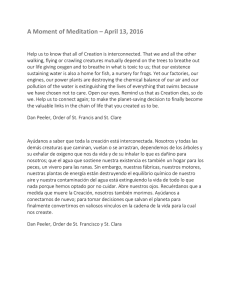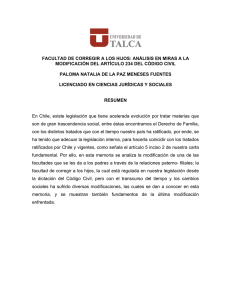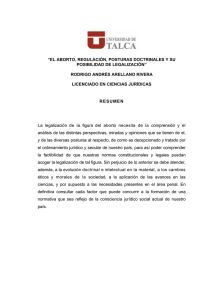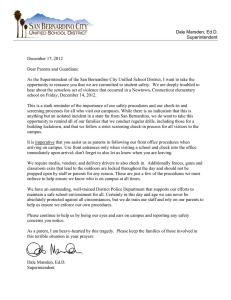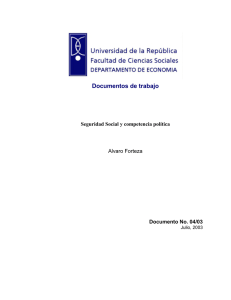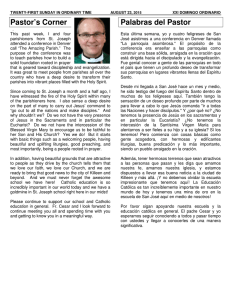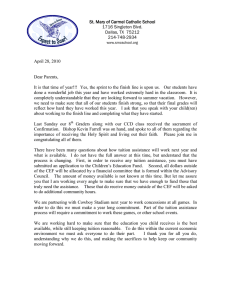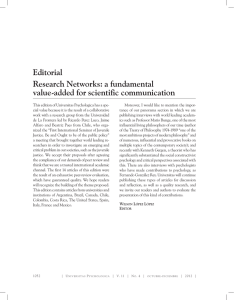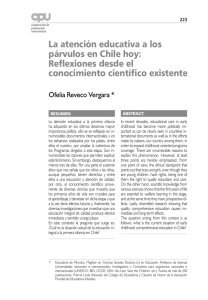Texto completo - Organization of American States
Anuncio
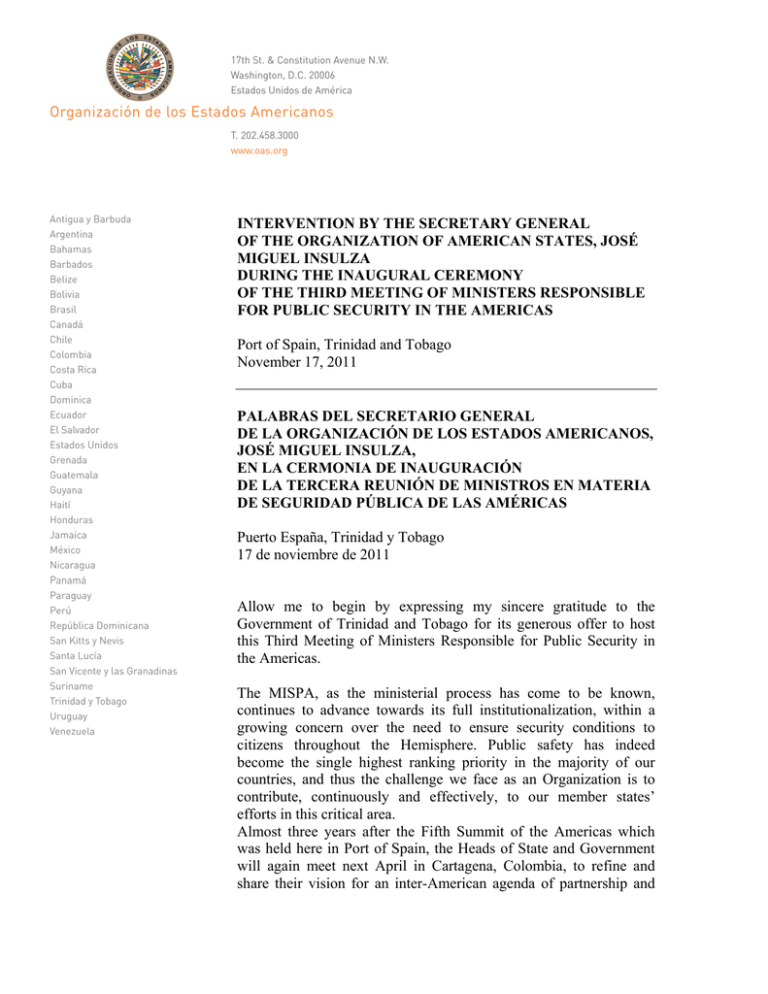
INTERVENTION BY THE SECRETARY GENERAL OF THE ORGANIZATION OF AMERICAN STATES, JOSÉ MIGUEL INSULZA DURING THE INAUGURAL CEREMONY OF THE THIRD MEETING OF MINISTERS RESPONSIBLE FOR PUBLIC SECURITY IN THE AMERICAS Port of Spain, Trinidad and Tobago November 17, 2011 PALABRAS DEL SECRETARIO GENERAL DE LA ORGANIZACIÓN DE LOS ESTADOS AMERICANOS, JOSÉ MIGUEL INSULZA, EN LA CERMONIA DE INAUGURACIÓN DE LA TERCERA REUNIÓN DE MINISTROS EN MATERIA DE SEGURIDAD PÚBLICA DE LAS AMÉRICAS Puerto España, Trinidad y Tobago 17 de noviembre de 2011 Allow me to begin by expressing my sincere gratitude to the Government of Trinidad and Tobago for its generous offer to host this Third Meeting of Ministers Responsible for Public Security in the Americas. The MISPA, as the ministerial process has come to be known, continues to advance towards its full institutionalization, within a growing concern over the need to ensure security conditions to citizens throughout the Hemisphere. Public safety has indeed become the single highest ranking priority in the majority of our countries, and thus the challenge we face as an Organization is to contribute, continuously and effectively, to our member states’ efforts in this critical area. Almost three years after the Fifth Summit of the Americas which was held here in Port of Spain, the Heads of State and Government will again meet next April in Cartagena, Colombia, to refine and share their vision for an inter-American agenda of partnership and cooperation as reflected in the Summit’s central theme, “Connecting the Americas: Partners for Prosperity.” At that Summit, the Hemisphere’s political leaders will consider, among other things, six key issues that affect every single country in the Americas, namely natural disasters, poverty and inequality, access to technology, physical integration, regional cooperation and citizen security have been selected for this Summit. The Chair of this Ministerial will be invited to share the outcomes of ministerial with the Summit Implementation Review Group (SIRG) when it convenes in January to begin considering the subject matter of Citizen Security and Transnational Organized Crime for the Summit of the Americas. Therefore, it is fitting that we are having this Ministerial level discussion on public security with the intention of forwarding recommendations to that Summit. It is an important thread that is critical to the overall goal of achieving a Summit architecture that is strong, forward looking, results-oriented and that ties together the various inter-American processes for the mutual benefit of all. Based on the principles of the Declaration on Security in the Americas, adopted in Mexico City a few years ago, and on the guidelines contained in the Commitment to Public Security in the Americas, adopted at previous OAS meeting, the General Secretariat has directed its human and technical resources to promote, from a multidimensional perspective, cooperation among member states on the key issues of public security management; prevention of crime, violence and insecurity; citizen and community participation and police management. Recent reports by a variety of international agencies, including the OAS, the World Bank, the United Nations Office on Drugs and Crime, and the United Nations Development Program, have made us well aware of our responsibility to act together in confronting the great threats posed by crime and violence to our democracies, to our institutions, to our social and economic development and to the welfare of our people. La criminalidad en nuestro continente se manifiesta en formas que varían significativamente de país a país e, incluso, entre regiones al interior de un mismo Estado. Sin embargo, la producción y el tráfico de drogas y armas ilícitas; el tráfico ilícito de migrantes; la trata de personas; el contrabando; el secuestro; la extorsión; los delitos contra la propiedad; el delito cibernético; la corrupción; el lavado de activos y la violencia contra las mujeres y los jóvenes, no conocen fronteras, y sus responsables permean con habilidad los límites geográficos y políticos en busca del establecimiento de centros de negocios y corredores propicios para sus fines de lucro. La acción efectiva de las instituciones ha contribuido a avanzar en el restablecimiento del imperio de la Ley en algunas zonas, han impulsado a las organizaciones criminales a buscar espacios nuevos para erigir sus estructuras delincuenciales. A su turno, regiones que durante mucho tiempo constituyeron territorios de paz y convivencia, se han visto golpeados por una actividad criminal creciente, en un ciclo que pareciera reproducir la violencia de manera irremediable. Los datos disponibles, de alguna manera reflejan el trayecto por el que se desplazan las actividades ilícitas, y las consecuencias que éstas dejan a su paso. En los países del Caribe, el número de homicidios intencionales pasó de 1.362 en el año 2000 a 2.634 en 2010, es decir, de 20.7 a casi 40 por cada cien mil habitantes. En Centro América, la tasa se incrementó de 26.7 a 41.4 por cada cien mil habitantes en el mismo período. De manera paralela, ha aumentado el número de homicidios cometidos con armas de fuego como proporción de la cifra total. En aquéllas regiones que se han visto más afectadas por el establecimiento de corredores criminales, ha aumentado al número de homicidios cometidos con armas de fuego como proporción de la cifra total. Y lo que resulta aún más alarmante, es que los hombres jóvenes, menores de 35 años, son los mayormente afectados, ya sea como víctimas o como perpetradores de la violencia armada. Es por ello, que ninguno de nuestros Gobiernos ni de nuestras sociedades es ajeno a la responsabilidad conjunta de cooperar en el propósito de combatir con igual empeño a los actores de la delincuencia. Como señalara recientemente la Secretaria de Estado de los Estados Unidos, Hillary Clinton, “se requiere de redes para enfrentar otras redes”, y la Organización Hemisférica, como máximo órgano político del Continente, se propone, justamente, propiciar y facilitar la construcción y consolidación de las redes necesarias para enfrentar estas amenazas y recuperar la tranquilidad y la seguridad para nuestros ciudadanos. Striving towards such effectiveness, the member states agreed to the proposal of the Government of Trinidad and Tobago to dedicate special attention to the key area of police management during this ministerial meeting. Police forces are tasked with the major responsibility of constituting the primary representatives of the state to guarantee compliance with the rule of law within a community, large or small. As such, the significance of fostering institutional capacity development to ensure the Police forces’ effective response, within a democratic framework, cannot be understated. In the same way in which the shared commitment of the international community is needed to tackle the threats posed by criminal networks, at the national level, advancing public security requires the engagement of the whole of society. Citizens’ trust in police officers is required to facilitate ownership and continuous dialogue, which will allow for timely reporting on criminal activities. Modern, accountable police institutions, respectful of human rights, will foster confidence building and support by the citizenry. Open channels of communication that facilitate participation, allowing for communities to express their priorities and needs, will provide police institutions with a better sense of the challenges faced at the local level. Governments, in turn, are assigned with the important duty of securing adequate selection, training, evaluation, and promotion processes, necessary to ensure a professional police force, whose officials are dignified, respected and provided with the living and working conditions that reflect the responsibilities they face every day. Durante la jornada de trabajo que hoy se inicia, dedicarán su atención a compartir sus conocimientos, sus experiencias y también sus inquietudes y las preocupaciones que los aquejan, en la compleja tarea de diseñar, implementar y evaluar las políticas y estrategias orientadas a garantizar la protección de la vida, la dignidad, las libertades individuales y los bienes de las personas sean protegidos y respetados. No es asunto fácil, en momentos en que, de acuerdo con el Informe Global sobre Homicidio presentado recientemente por Naciones Unidas, que nos señala que en algunos países de la región, uno de cada 50 hombres de 21 años no llegará a la edad de 30. Hay resultados positivos. En algunos países ha sido posible disminuir las tasas de homicidio y los indicadores relacionados con otros delitos de manera sostenida como ha ocurrido en algunos países de la región Andina y en el Cono Sur. Otros países, han alcanzado importantes progresos en materia de análisis de información y uso de tecnologías. Los decomisos de cargamentos de drogas ilícitas han aumentado sustancialmente a lo largo de los últimos diez años. Esperamos que éste sea el espacio propicio para compartir esas experiencias y, que a partir de un intercambio dinámico, se fortalezca una plataforma de desarrollo de capacidades institucionales para el avance de la seguridad pública, basada en la cooperación horizontal, entre los países de la región. El Acuerdo de Cooperación firmado entre la Secretaría General de la OEA y la Presidencia de AMERIPOL en el marco de la 41 Asamblea General de la Organización, el pasado mes de junio, nos ofrece un mecanismo valioso para la transferencia de conocimientos que facilitará superar las asimetrías existentes entre las instituciones policiales de nuestros países. Esperamos fortalecer una red incluyente, que integre a otras asociaciones policiales de las Américas, como la Comisión de Jefes y Jefas y Directores de Policía de Centroamérica y la Asociación de Comisionados de Policía del Caribe. Creo que toda nuestra cooperación, nuestro apoyo a las fuerzas policiales de la región es un elemento muy central de la actividad que deben realizar nuestros gobiernos que en la lucha contra el crimen. I would like to close without expressing our sense of solidarity by, if you may allow me quoting you Madame Prime Minister on a reference made during your speech last September 24, on the occasion of the Day of the Republic which illustrates our common purpose in this sense. When referring to people in uniforme you said, I quote: “Theirs is not an easy task, yet they have gone about it with a level of professionalism and commitment that has earned the gratitude and pride of the nation they defend so well today. “There is a sense that we are all in this together, a commitment to make the sacrifice for the greater good of all of us (…) We must never take the freedoms we enjoy for granted, but to fight for their preservation. (…)… in this context, our 35th Anniversary as a Republic holds even greater significance as it becomes a time for us to cherish our hard fought freedoms.” The task ahead is enormous, but I am confident that by working together in a meaningful and sincere manner, we can all make a difference in reducing the scourge of violence and crime in our societies. Thank you, muchas gracias, and I wish you all the very best for a successful meeting.
